What Are Aromatherapy Scents
Looking to enhance your well-being and mood naturally? Aromatherapy might be the answer you’re looking for.
We will explore the world of aromatherapy blends, essential oils, and their benefits. From floral to citrus, earthy to minty scents, we will delve into how each type can impact your mood and overall health.
Discover how to choose the right aromatherapy scents for you and the potential risks and side effects to be aware of. Begin your aromatherapy journey now!
Key Takeaways:
What is Aromatherapy?
Aromatherapy is a holistic healing practice that utilizes essential oils extracted from plant sources to promote health, relaxation, and overall well-being. These essential oils are derived from plant extracts such as lavender, bergamot, lemon, peppermint, rosemary, tea tree, and ylang ylang.
These oils are commonly used in various ways, including inhalation, topical application, and massage therapy, to harness their therapeutic properties. Whether diffused in the air to create a calming ambiance or applied directly to the skin for specific benefits, essential oils play a vital role in aromatherapy practices.
Each essential oil boasts unique healing properties that target different aspects of physical, emotional, and mental health.
What Are Essential Oils?
Essential oils are concentrated plant extracts that are obtained through distillation or mechanical methods. These oils are highly potent and contain the essence of the plant from which they are derived, offering various therapeutic benefits.
The extraction process involves steaming or pressing plant materials to collect the aromatic compounds, which are then condensed into a highly concentrated form. Each essential oil carries a unique composition of compounds that give them distinct aromas and medicinal properties. From calming lavender to invigorating peppermint, the diversity of essential oils allows for a wide range of applications in aromatherapy and wellness practices.
How Are Essential Oils Used in Aromatherapy?
In aromatherapy, essential oils are used in various ways to harness their therapeutic benefits. They can be diffused through a diffuser, blended with carrier oils for massage therapy, or directly inhaled for quick relaxation.
One common method of utilizing essential oils in aromatherapy is through diffusion. By dispersing the aromatic molecules into the air, diffusers can spread the benefits of oils throughout a room, promoting a sense of well-being.
Another approach is blending essential oils with carrier oils to create massage blends. This application method not only enhances relaxation but also allows for topical absorption, providing localized therapeutic effects. Learn more about what aromatherapy uses for scents.
Inhalation techniques involve inhaling the aroma directly from the bottle or using tools like inhalers to experience the effects quickly.
What Are Aromatherapy Scents?
Aromatherapy scents are the aromatic essences derived from essential oils used in the practice of aromatherapy. These scents range from floral and citrusy to earthy and herbal, each offering unique benefits and effects on the mind and body.
The floral scents like lavender and rose are renowned for their calming properties, helping to reduce stress and promote relaxation. On the other hand, citrusy scents such as lemon and orange are invigorating and can boost energy levels. Earthy scents like sandalwood and patchouli are grounding and mood-stabilizing, ideal for enhancing focus and concentration. Herbal scents such as peppermint and eucalyptus are often used for their refreshing and sinus-clearing properties.
What Are the Benefits of Aromatherapy Scents?
The benefits of aromatherapy scents extend beyond just pleasant fragrances. They are known to promote relaxation, reduce stress and anxiety, improve sleep quality, enhance mood, and even provide relief from certain health conditions.
Using lavender essential oil, for instance, can calm the mind and aid in reducing symptoms of insomnia and anxiety. On the other hand, the invigorating scent of eucalyptus oil can help alleviate respiratory issues and congestion. The warm, grounding aroma of sandalwood is known for its ability to enhance focus and mental clarity, making it a popular choice for meditation practices. Additionally, peppermint oil is often used to alleviate headaches and improve digestion.
How Do Aromatherapy Scents Work?
Aromatherapy scents work by stimulating the olfactory system, which triggers reactions in the brain that can influence emotions, memories, and physiological responses. When used in massage therapy, these scents can also be absorbed through the skin for added benefits.
During aromatherapy, the molecules from essential oils interact with olfactory receptors in the nose, sending signals to the limbic system in the brain, including the amygdala and hippocampus, which play key roles in processing emotions and memories.
This interaction can evoke relaxation, improve mood, reduce stress, and even alleviate pain. In massage therapy, these scents not only enhance the sensory experience but also penetrate the skin, offering a direct route for the therapeutic properties of the oils to enter the bloodstream and exert their effects systemically.
What Are the Different Types of Aromatherapy Scents?
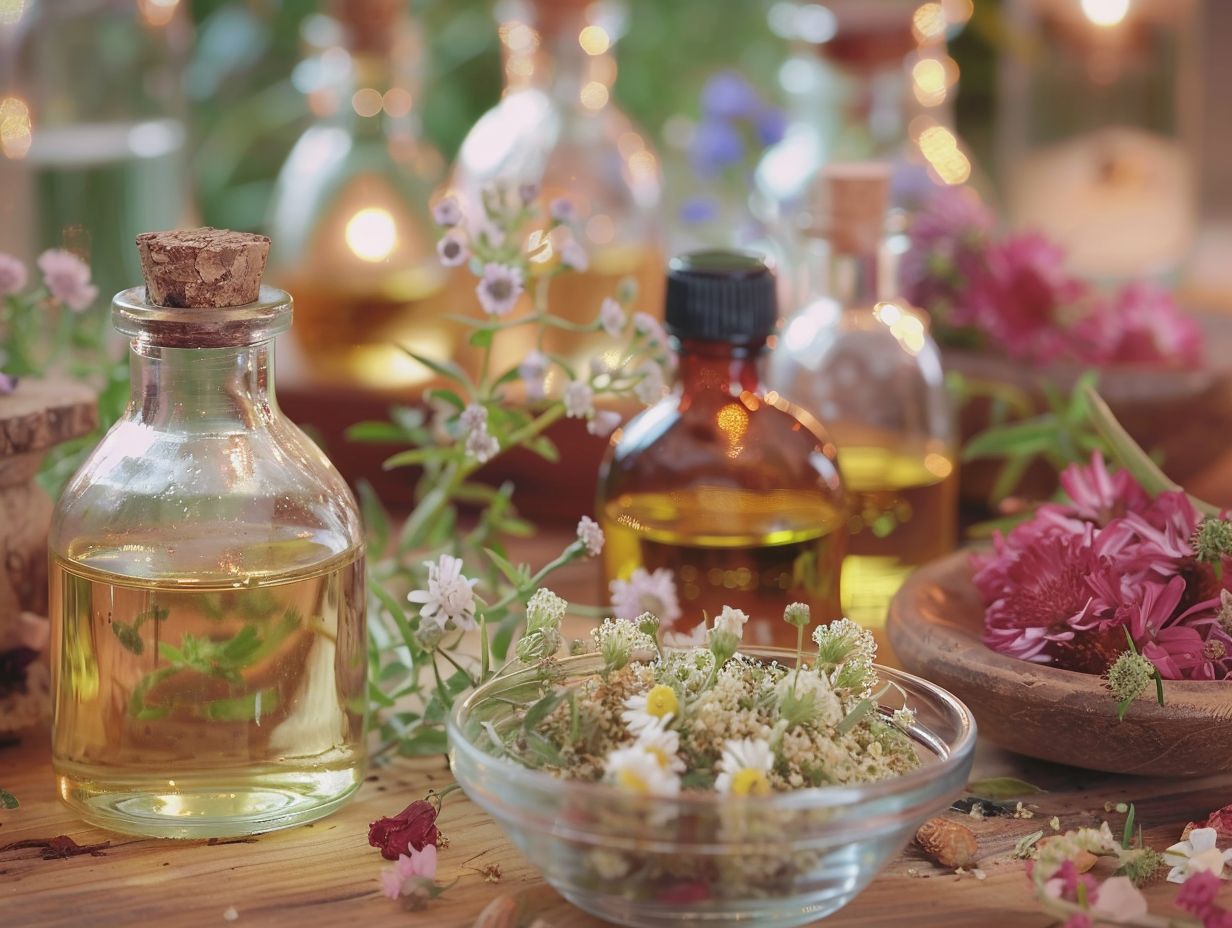
Aromatherapy scents come in a wide array of types, including floral, citrusy, earthy, spicy, woody, herbal, minty, and fruity. Each type has its unique characteristics and benefits for aromatherapy purposes.
Floral scents, such as rose and lavender, are known for their calming properties, making them popular choices for relaxation and stress relief. Citrusy scents like lemon and orange are invigorating and uplifting, perfect for boosting mood and energy levels. Earthy fragrances, such as patchouli and vetiver, are grounding and can help promote feelings of stability and balance.
Spicy scents like ginger and cinnamon are often used for their warming and stimulating effects, ideal for increasing circulation and easing muscle tension. Woody scents, such as cedarwood and sandalwood, have a comforting and grounding nature, making them beneficial for meditation and focus.
Floral Scents
Floral scents in aromatherapy, such as lavender and ylang ylang, are known for their calming and soothing properties. These scents evoke a sense of tranquility and relaxation, making them popular choices for stress relief and promoting a peaceful environment.
The therapeutic benefits of these floral fragrances extend beyond just their pleasant smell. Lavender, for example, is widely used to alleviate anxiety and improve sleep quality. Its aroma helps in reducing insomnia and promoting a deep, restful sleep. Ylang ylang, on the other hand, is valued for its ability to uplift mood and boost self-esteem, making it a key ingredient in many mood-balancing products. These flowers not only enhance well-being but also aid in relaxation and emotional harmony.
Citrus Scents
Citrus scents, including lemon and bergamot, are refreshing and energizing in aromatherapy. These scents can uplift the mood, increase focus and concentration, and create a vibrant atmosphere.
The invigorating properties of citrus scents go beyond just their pleasant aroma; they have a profound impact on one’s mental state. Lemon, with its zesty and bright fragrance, is known for its ability to clear the mind and promote mental clarity. On the other hand, bergamot, with its unique floral-citrus scent, is often used to boost energy levels and inspire positivity. Explore more about aromatherapy effects to learn about the benefits of different scents.
When these citrus scents are diffused in the air or applied in essential oil blends, they can work wonders in enhancing cognitive function, sharpening focus, and revitalizing the spirit.
Earthy Scents
Earthy scents like rosemary and tea tree are grounding and revitalizing in aromatherapy. These scents are often used for their purifying effects, mental clarity, and immune-boosting properties.
In the world of aromatherapy, these earthy fragrances are cherished for their ability to connect individuals with a deeper sense of stability and resilience. When inhaled, the aromatic molecules of rosemary and tea tree can stimulate the brain, enhancing focus and mental acuity. The cleansing properties of these scents are believed to cleanse the mind and spirit, creating a sense of purity and renewal.
Spicy Scents
Spicy scents like peppermint offer invigorating and refreshing qualities in aromatherapy. Peppermint is known for its cooling effect, mental clarity enhancement, and digestive support.
The stimulating properties of peppermint can help in increasing alertness, making it an ideal choice for staying focused during work or study sessions. Its relaxing qualities can aid in relieving tension and promoting a sense of calmness and wellbeing.
Peppermint’s digestive benefits are well-documented, as it can assist in soothing indigestion, bloating, and stomach discomfort. The unique combination of its aroma and healing properties makes peppermint a versatile essential oil in holistic well-being practices.
Woody Scents
Woody scents like vetiver are grounding and comforting in aromatherapy. Vetiver scent promotes relaxation, stress reduction, and emotional balance, making it ideal for calming the mind and body.
Vetiver’s therapeutic benefits extend beyond just emotional well-being; it is also known for its ability to enhance focus and concentration, perfect for those seeking mental clarity. The warm, earthy aroma of vetiver oil can bring about a sense of peace and serenity, easing feelings of anxiety and tension. In addition, this essential oil is often used in skincare products for its hydrating and rejuvenating properties, offering a holistic approach to both mental and physical wellness.
Herbal Scents
Herbal scents in aromatherapy, such as rosemary and chamomile, offer therapeutic benefits for relaxation, focus, and stress relief. These scents are associated with natural healing properties and mental clarity enhancement.
The calming effects of herbal scents can help reduce anxiety levels and promote a sense of well-being. The distinct aroma of rosemary is known to stimulate cognitive function, aiding in concentration and memory retention.
On the other hand, chamomile’s gentle scent is widely cherished for its ability to induce feelings of tranquility and induce peaceful sleep. These herbal scents not only fill the air with delightful fragrances but also have profound impacts on the body and mind, creating a harmonious environment for relaxation and rejuvenation.
Minty Scents

Minty scents, particularly peppermint, are known for their cooling and revitalizing effects in aromatherapy. Peppermint scent can enhance mental clarity, improve respiratory function, and provide a refreshing sensation.
The refreshing essence of peppermint not only invigorates the senses but also stimulates cognitive function, promoting heightened alertness and concentration. In addition, the inhalation of peppermint aroma aids in clearing the respiratory passages, making it beneficial for individuals struggling with congestion or seasonal allergies. This aromatic wonder is a natural energizer, infusing a burst of vitality into daily routines, leaving one feeling rejuvenated and revitalized.
Fruity Scents
Fruity scents like citrus and ylang ylang offer uplifting and soothing qualities in aromatherapy. These scents promote positivity, relaxation, and emotional balance, creating a refreshing and harmonious environment.
Citrus scents, such as those from lemons and oranges, are known to invigorate the senses and boost energy levels, making them perfect for combating feelings of fatigue and low mood. On the other hand, ylang ylang is admired for its calming and sedative properties, helping to reduce anxiety and promote a sense of peace and tranquility. When these scents are introduced into a space, they have a remarkable ability to elevate mood, encourage relaxation, boost creativity, and inspire a greater sense of well-being.
The aromatherapeutic benefits of citrus and ylang ylang extend beyond just mood enhancement. These scents have the power to reduce stress levels, lower blood pressure, and even improve overall cognitive performance. By incorporating them into your daily routine through essential oils, candles, or diffusers, you can create a calming oasis that fosters emotional harmony and nurtures your mental and physical state. Embracing the uplifting and soothing properties of fruity scents in aromatherapy is a simple yet profound way to prioritize your well-being and enhance the quality of your life.
How to Choose the Right Aromatherapy Scents for You?
Choosing the right aromatherapy scents involves considering your mood, needs, and preferences. By aligning the scent characteristics with your desired outcomes, you can create a personalized aromatherapy experience tailored to your well-being.
When selecting aromatherapy scents, start by understanding the impact different scents can have on your mind and body. Consider how lavender can promote relaxation, citrus scents can boost energy, or peppermint can enhance focus. It’s essential to assess what you’re looking to achieve through aromatherapy. Are you seeking stress relief, better sleep, or increased concentration? Tailoring your aromatherapy to these specific needs can optimize the benefits you receive. Don’t forget to factor in your personal preferences when choosing scents, as enjoying the aroma plays a significant role in enhancing the experience.
Consider Your Mood
When choosing aromatherapy scents, consider your current mood and emotional state. Select scents that align with your mood goals, whether you seek relaxation, rejuvenation, focus, or emotional balance.
Aromatherapy is a powerful tool that utilizes the sense of smell to influence emotions and promote overall well-being. The sense of smell is closely linked to the emotional centers of the brain, making it an effective way to manage feelings and boost mood. Essential oils are known for their ability to evoke specific emotional responses due to their unique chemical compositions.
For instance, if you are feeling stressed and in need of relaxation, opt for calming scents like lavender or chamomile. These scents can help soothe your mind and body, promoting a sense of peace and tranquility.
Consider Your Needs
Identify your specific needs when choosing aromatherapy scents, whether for relaxation, stress relief, improved sleep, or physical wellness. Tailor your scent selection to address your well-being goals effectively.
Understanding the power of scent in aromatherapy is key to harnessing its benefits. Essential oils hold unique properties that can influence mood, energy levels, and overall health. For relaxation, scents like lavender and chamomile can induce calmness, while citrus scents like lemon and orange are uplifting. To aid with stress relief, consider using soothing scents like rose or sandalwood. Deep breathing exercises combined with your chosen scent can enhance the relaxation process, promoting a sense of peace and tranquility.
Consider Your Preferences
Preferences play a crucial role in selecting aromatherapy scents that resonate with your senses and well-being. Choose scents that you find pleasing and comforting to create a harmonious and enjoyable aromatherapy experience.
In terms of aromatherapy, the power of scents goes beyond just fragrance – it can uplift your mood, reduce stress, and promote relaxation. To enhance the benefits, try different essential oils like lavender for tranquility, citrus for an energy boost, or eucalyptus for a refreshing vibe. Experimenting with various scents allows you to tune in to what suits you best, ultimately customizing your aromatherapy routine for maximum therapeutic impact. Whether it’s through diffusers, oils, candles, or bath products, the right scent can truly transform your ambiance and mindset.
Are There Any Risks or Side Effects of Aromatherapy Scents?
While aromatherapy scents offer numerous benefits, there are potential risks and side effects to consider. These may include skin irritation, allergic reactions, and interactions with certain medications that could impact your health and well-being.
Understanding the potential risks associated with aromatherapy is crucial for ensuring safe usage. Skin irritation and allergic reactions are common side effects that individuals may experience, especially if they have sensitive skin or existing allergies. It is important to perform a patch test before using any essential oil to check for adverse reactions.
Interactions between essential oils and medications can be complex and may lead to unwanted effects. Some essential oils can interfere with certain drugs, affecting their effectiveness or causing unexpected reactions. Consulting a healthcare professional before incorporating aromatherapy into your routine is advisable to mitigate any potential risks.
Skin Irritation
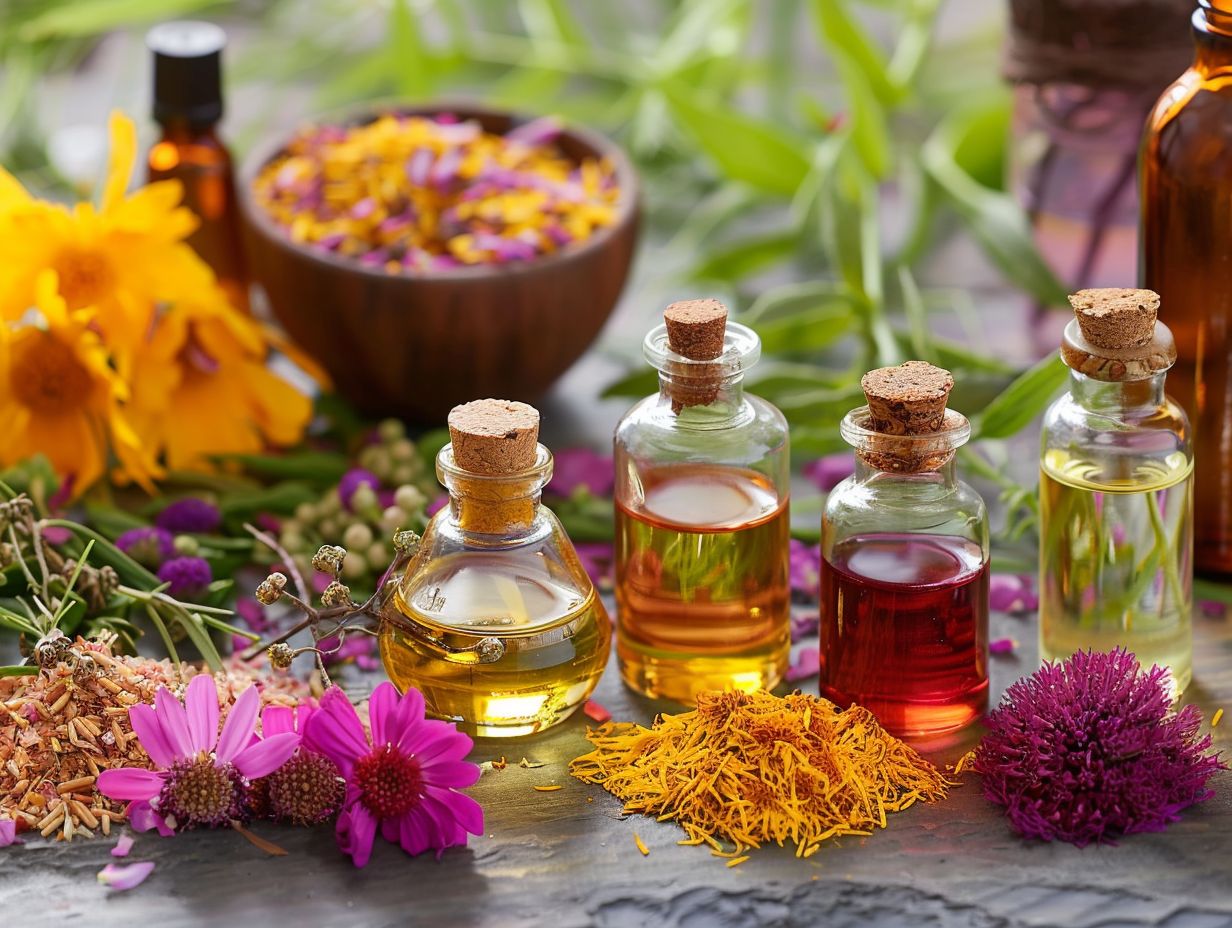
Risk of Skin Irritation in Aromatherapy:
Some essential oils, such as citrus oils, peppermint, and cinnamon, are known to be more potent and can cause skin irritation if not properly diluted. Conducting a patch test involves applying a small amount of diluted oil to a small area of skin and observing for any redness, itching, or swelling. To minimize the likelihood of adverse reactions, always dilute essential oils properly before using them, and consider using a carrier oil like coconut or jojoba.
It is also crucial to store essential oils properly, in a cool, dark place, and away from direct sunlight to maintain their potency and reduce the risk of oxidation.
Allergic Reactions
Some individuals may experience allergic reactions to certain essential oils used in aromatherapy. It is vital to be aware of potential allergens and discontinue use if any adverse symptoms, such as skin rashes or respiratory issues, occur.
Common essential oils like lavender, peppermint, and tea tree are generally well-tolerated, but individuals with sensitivities may still react unfavorably. It is crucial to patch-test oils before widespread use.
Allergic responses can manifest as itchiness, redness, swelling, or difficulty breathing. If such reactions occur, immediate discontinuation of the oil is recommended to prevent further complications.
Consulting with a healthcare professional is advisable for those prone to allergies or sensitivity to certain substances. Understanding potential risks and knowing how to react can safeguard your well-being during aromatherapy practices.
Interactions with Medications
Certain essential oils used in aromatherapy may interact with medications, affecting their efficacy or causing unwanted side effects. It is advisable to consult a healthcare provider before incorporating aromatherapy into your wellness routine, especially if you are on medications.
When essential oils are inhaled or applied topically, they can enter the bloodstream and potentially interfere with the way medications are metabolized by the body. Some essential oils, such as lavender or peppermint, might amplify the effects of certain medications, while others like grapefruit oil can inhibit enzymes responsible for drug breakdown.
Therefore, caution is key when blending traditional medicine with aromatherapy practices. Always inform your healthcare provider about the essential oils you plan to use alongside your medications to prevent any adverse reactions or decreased effectiveness of your prescribed treatment.
Frequently Asked Questions
What are Aromatherapy Scents?
Aromatherapy scents are natural plant extracts, such as essential oils, that are used for therapeutic purposes. These scents are believed to have healing properties and can be inhaled, applied topically, or diffused to promote physical and emotional well-being.
How do Aromatherapy Scents work?
Aromatherapy scents work by stimulating the olfactory system, which is connected to the part of the brain that controls emotions and memories. When certain scents are inhaled, they can trigger specific responses in the body, such as relaxation, pain relief, or improved mood.
What are some popular Aromatherapy Scents?
Some popular aromatherapy scents include lavender, peppermint, eucalyptus, tea tree, and chamomile. Each of these scents has unique properties and can be used to address different physical or emotional concerns.
Can Aromatherapy Scents be used for specific purposes?
Yes, aromatherapy scents can be used for specific purposes depending on the desired effect. For example, lavender is often used for relaxation and improving sleep, while peppermint is commonly used for headaches and nausea relief.
Are there any side effects of using Aromatherapy Scents?
Generally, aromatherapy scents are considered safe for most people when used properly. However, some individuals may experience allergic reactions or skin irritation from certain scents. It’s important to always use a carrier oil when applying scents topically and to check for any potential allergies before use.
Can Aromatherapy Scents be used in combination with other treatments?
Yes, aromatherapy scents can be used in combination with other treatments, such as massage therapy or medication. However, it’s important to consult with a healthcare professional before using scents alongside any prescribed medications to ensure there are no potential interactions.


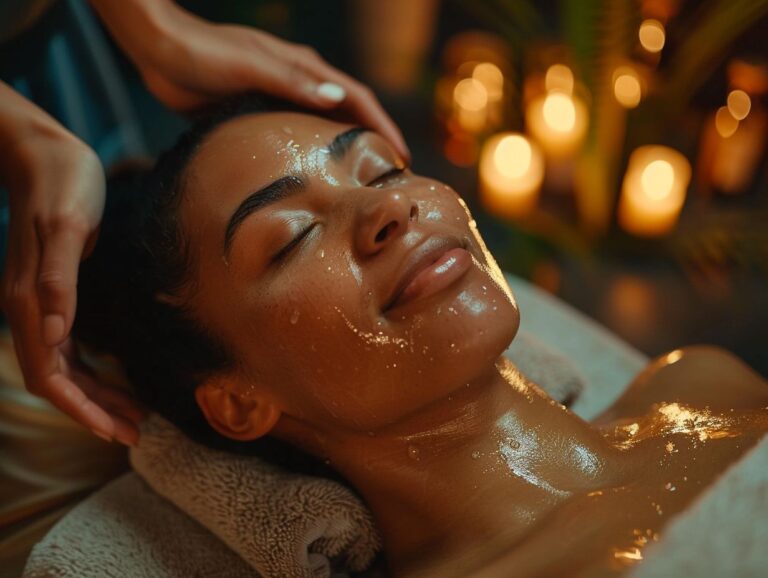
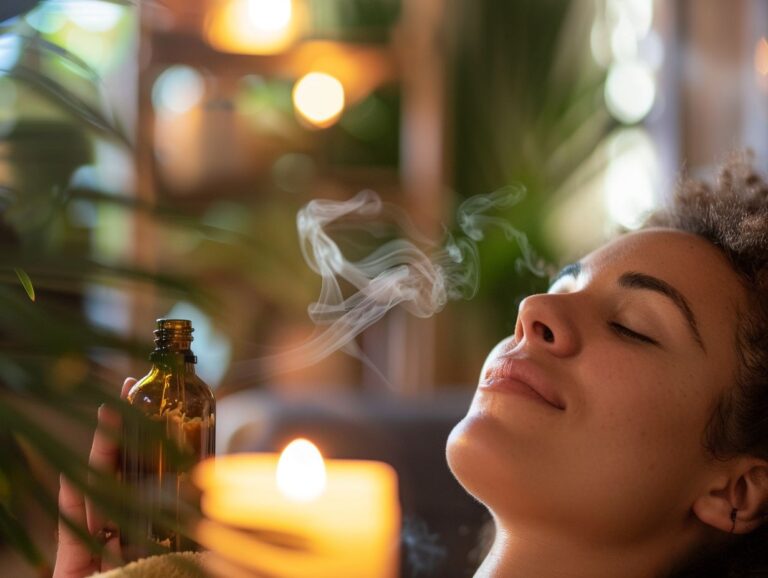
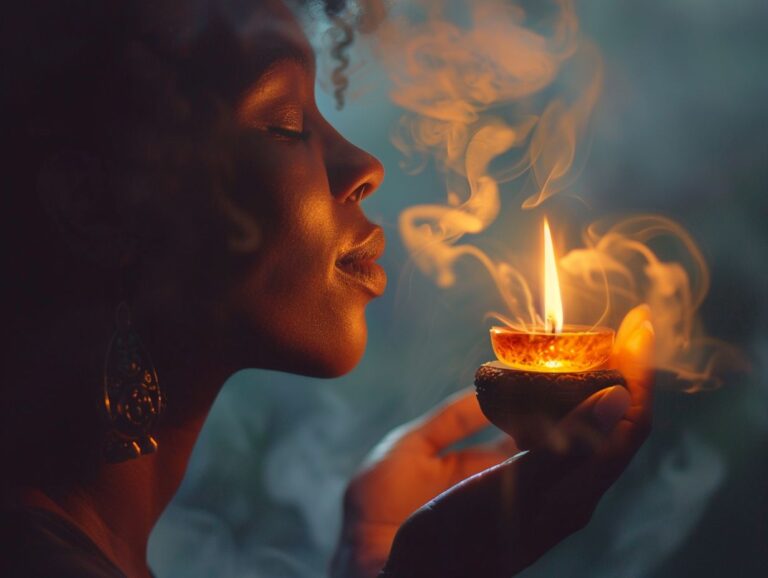

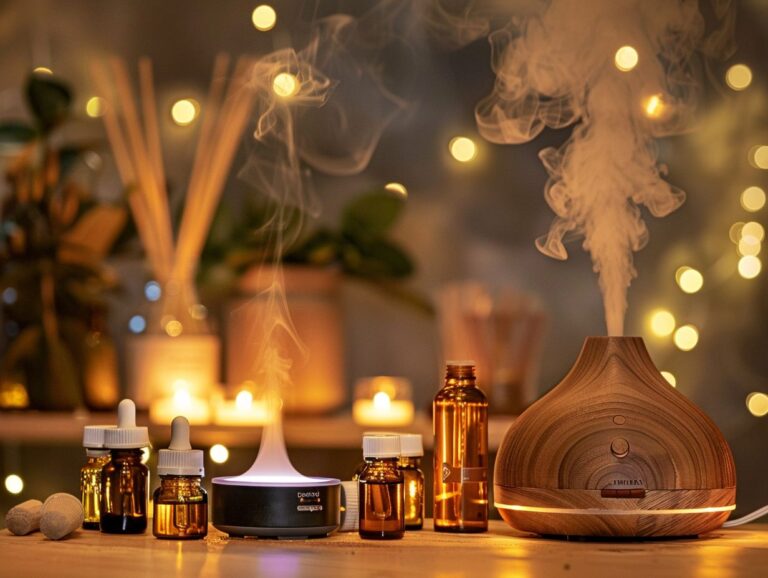
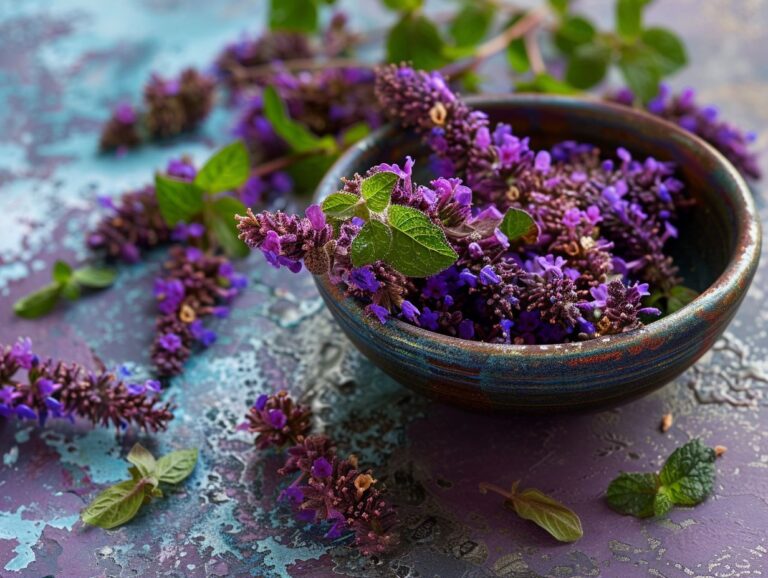
3 Comments